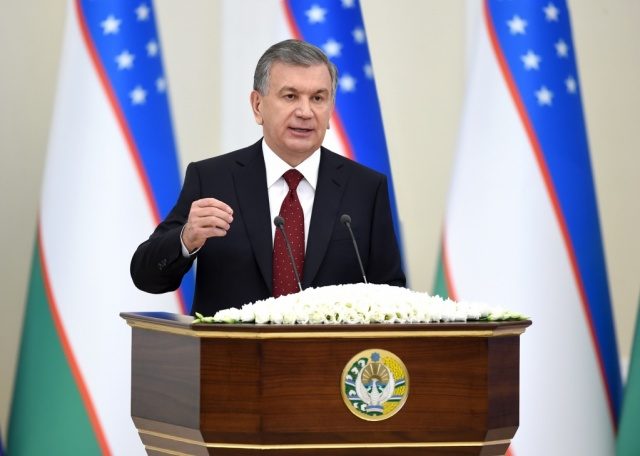
Uzbekistan’s President Considers Giving up Some Executive Powers
Publication: Eurasia Daily Monitor Volume: 16 Issue: 1
By:

Uzbekistan’s President Shavkat Mirziyoyev delivered his annual State of the Nation address on December 28, 2018. One area of focus in his speech was the decentralization of presidential power. Mirziyoyev’s true views on the issue surfaced when he went off script and revealed his frustrations with the extremely centralized system of executive power in Uzbekistan. According to him, this works against his efforts to liberalize the country’s government. His corrective proposals were far from drastic, offering only slightly more powers to the parliament, governors and regional councils then they currently have. Nevertheless, publicly recognizing the inefficiencies of the overwhelming power at the top of the system and a willingness to transfer some of those authorities elsewhere unquestionably represent a step forward for political reform and liberalization in this Central Asian state.
In his State of the Nation speech, Mirziyoyev offered three concrete steps. First, he proposed transferring the president’s power to approve the members of the Cabinet of Ministers to the parliament (Kun.uz, December 28, 2018). Currently the Cabinet of Ministers consists of the prime minister and his eight deputies. The national legislature does have some limited oversight over the cabinet, but only when it comes to the prime minister. In his off-script comments, Mirziyoyev described his proposal as a measure to increase the accountability of the deputy prime ministers before the peoples’ representatives rather than have them solely report to him. Mirziyoyev stated, “Officials should prove [to the parliament] they are worth being appointed and are able to perform in the post.” It seems that, by increasing the parliament’s oversight power, President Mirziyoyev wants the legislative branch to help him prod prime ministers. For Mirziyoyev, these steps are necessary for building a democratic system of governance and fulfilling the promise he made two years ago to transfer some of his competencies to the parliament.
Mirziyoyev’s second proposal was to increase the power of local legislative bodies—the self-governing regional, district and city councils (kengash) of people’s deputies, which function under regional governors. Specifically, Mirziyoyev proposed that the councils be empowered to approve the governors, since, presumably, the local council members would be more familiar with potential heads of their regions than the national head of state would be. And to ensure the impartiality of these councils, Mirziyoyev proposed ending the practice of appointing the governors as chairs of said councils.
Mirziyoyev’s third and most important proposal was to increase the decision-making power of governors by giving them the rights to appoint finance, economic, construction, housing, utility, and investment heads of their region. Mirzyoyev explained that the 2018 experiment in the city of Tashkent, where such appointments were done without the presidential administration’s involvement, resulted in increased local budgets and the closure of unnecessary government agencies. As result, the president said, he was ready to roll out the practice nationwide.
According to Uzbekistan’s leader, the established practice of regional governors waiting for directions from the president has resulted in widespread shirking of responsibility and passive local power centers unable to resolve regional issues independently. Mirziyoyev mocked the absurdity of the country’s overly centralized system of decision-making, wondering out loud why his administration needs to approve a head of the district committee of public education in a particular region. Mirziyoyev specifically stated that the practice of officials awaiting directives from the top—governors from the president’s office, sub-regional governors from their governors—needs to end.
These three proposals alone have already been worked into the “State Program for 2019” (2019.strategy.uz, January 3, 2019). The document, which is currently in the public commenting stage, details the agencies responsible for executing this strategic development plan for Uzbekistan and outlines the timelines in 2019 for accomplishing these goals.
Mirziyoyev has framed the above-described reforms as the beginning of a “bottom-up” process of changes and a departure from heretofore “top-down” instructions. According to the president’s own words, in truly democratic countries, decisions are made at the local level. He explained to his audience that cultivating greater power at local levels will increase a sense of ownership in the political process to local officials and increase their responsibility. “I have a lot of rights under the constitution, but I will be slowly departing from them as we adopt a democratic system of governance,” concluded Mirziyoyev (Kun.uz, December 28, 2018).
Unquestionably, Mirziyoyev is trying to loosen the current setup of centralized power in Uzbekistan. On the one hand, he wants legislative bodies at both at the state and local levels to strengthen their oversight powers over the executive branch. And on the other hand, he wants regional governors to start making independent decisions and own up to the consequences. Such an arrangement will distance the president from more trifling tasks in favor of focusing on significant issues affecting the entire state.
This limited transfer of power to the parliament and regional governments could eventually lead to increased efficiency, responsibility, and sustainability of public administration necessary for liberalization. Therefore, these steps have long-term implications. The reforms are short of a dedicated leap toward the true decentralization of power, long overdue for the country. But after all, Uzbekistan is well-known for avoiding drastic turns and taking cautious steps.



